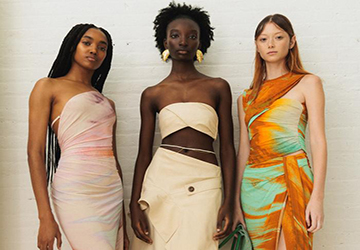Are you curious about the latest luxury trends to stay ahead of the game in 2023? As we enter a new year, the luxury industry continues to evolve, presenting exciting opportunities for brands to engage with their audience, establish authority, and boost visibility.
Do you know that the luxury goods industry is thriving with a whopping revenue of over $312 billion in 2022? And what's more, it is expected to grow at more than 5% annually.
But with changing consumer behavior and economic headwinds, luxury brands must differentiate themselves in authentic and actionable ways.
This article will explore the top 10 luxury trends to watch in 2023 and how they can take your brand to the next level.
Read on to stay ahead of the competition and elevate your brand in the luxury space.
Let's get started!
10 Latest Luxury Trends that Will Shape 2023
Get ready to step into the world of luxury as we delve into the top 10 trends that will shape the industry in 2023.
From the latest fashion to the marketing trend, we've covered you with all the must-know information.
So, let's dive in and discover what's in store for the world of luxury!
1.Embracing E-commerce: The Future of Luxury Sales

Are you ready for a glimpse into the future of luxury shopping? With the pandemic pushing more consumers towards online shopping, luxury brands must seize this opportunity to capitalize on eCommerce.
According to the experts at Statista, a whopping 25% of all luxury goods sales are expected to occur online by 2025. That's right; online shopping is no longer just for bargain hunters - it's also becoming the go-to option for discerning luxury buyers.
So, if you're a luxury brand looking to stay ahead of the curve, you must up your eCommerce game - and fast!
By embracing the digital world in a scalable way, you'll be able to gain a competitive edge and tap into the lucrative online market.
2.Luxury Resale: Prioritizing Second-Hand Goods
Luxury resale is on the rise and is not just a passing trend. Major luxury brands like Rolex, Balenciaga, and Gucci are launching their resale programs, allowing consumers to shop sustainably and boosting brands' sustainability credentials.
Even online marketplaces like The RealReal and Vestiaire Collective feel the effects as luxury brands take control of their second-hand markets.
LVMH recently launched Heristoria.com, a hyper-curated platform for archive items, offering exclusive in-person experiences with each purchase.
As luxury brands continue to bring resale in-house, the future of online marketplaces remains to be seen.
3.Luxury in the Metaverse
Luxury is going beyond the physical world and entering the metaverse. Virtual influencers are gaining popularity among younger generations and luxury shoppers, allowing brands to empower individual identities beyond physical appearances.
With Apple's mixed reality headset set to launch in 2023, the metaverse will become more accessible to mass consumers, creating a new frontier for luxury brands.
However, luxury brands lag in metaverse readiness, with only Gucci, Louis Vuitton, and Burberry scoring high on a metaverse readiness survey.
Luxury brands must start thinking about their metaverse strategy to get ahead of the competition and capitalize on a new business frontier.
4.Consumer-Focused Tech
Luxury retail is undergoing a tech revolution, with consumer-focused technology emerging as one of the biggest trends. To build a stronger connection with consumers, luxury brands are turning to tech-like videos,
NFTs and ethical behavioral data. This helps put customers at the forefront of initiatives and drives a closer relationship between brand and consumer.
By adopting marketing messages to be consumer-focused, luxury brands can tap into the emotions of their audience.
Instead of just showcasing their products, they can communicate how they make consumers feel - creating a more personal and powerful message.
5.Storytelling: A Top Luxury Marketing Trend
In today's digital age, luxury retailers must do more than sell products; they need to connect with their consumers meaningfully, and that's where storytelling comes in.
Using storytelling as a marketing strategy, luxury brands can showcase their brand value while building a community of consumers who share similar values.
Telling a story helps your brand stand out in a sea of digital content and creates a deeper connection with your consumers. It also enables you to understand your audience better, which is crucial for creating effective marketing campaigns.
By showcasing your brand value engagingly and authentically, you can foster better relationships with your consumers and demonstrate what sets your brand apart.
So, as a luxury retail brand, take advantage of this important trend - embrace storytelling to connect with your audience on a deeper level.
6.Investing in Self and Feel-Good Luxury Assets

Luxury is no longer just about flashy displays of wealth but also about investing in oneself for long-term well-being and fulfillment.
People seek experiential luxury, investing in goods that hold value over time and appreciate, like high-end watches, sneakers, wines, and designer bags.
However, it's essential to keep in mind the authenticity of these goods, and blockchain technology is emerging as a solution to improve the authentication process.
As luxury brands focus more on experiential and alternative value-holding assets, they will continue to attract affluent consumers seeking to invest in themselves and their future.
7.Utility NFTs: Real-world value and practical use
Luxury brands are known for their craftsmanship and innovation, and in 2023 we can expect to see more innovative NFT luxury projects that go beyond speculation.
Brands are leveraging blockchain technology to experiment with the real-world applications of virtual ownership and authentication of physical goods, offering tangible functions with emerging business models.
NFTs are becoming more understood and adopted, and companies like Courtyard and Wiv use blockchain to tokenize physical goods for accessible collection and trade.
The NFT can be burned to redeem the physical good at any point, making it a practical and valuable utility.
8.Eco-Conscious Travel
Luxury travel brands are making sustainability a priority as more consumers are demanding eco-conscious options. Forbes reports that the luxury sector is already adopting sustainable practices, such as reducing carbon emissions in shipping.
With sustainability being an essential factor for 60% of global consumers, luxury travel brands must focus on creating unique experiences while being mindful of their environmental impact.
Incorporating sustainability messaging into their marketing initiatives can help brands connect with eco-conscious consumers.
9.Solo Travel
Solo travel is a rising trend in luxury travel, and it's not just because of the pandemic. According to Statista, solo trips are becoming increasingly popular, and luxury travel brands should take notice.
One way to capitalize on this trend is by creating targeted content, such as videos and articles aimed at solo travelers.
Paid ad campaigns targeting solo travel keywords and adding a section on your website dedicated to solo travel are also effective ways to attract luxury travelers.
Luxury travel brands can tap into a new and lucrative market by providing tailored experiences and catering to this growing segment of travelers.
10.Eco-Conscious Hospitality
Eco-consciousness is a rapidly growing trend among luxury consumers; the hospitality industry is no exception.
To meet the expectations of environmentally conscious guests, luxury hotels should prioritize sustainability in their operations.
This could include reducing plastic use, investing in recycled or upcycled furniture, and committing to reducing carbon emissions.
Additionally, purchasing ethically sourced hospitality products can further demonstrate a commitment to eco-consciousness.
By implementing and promoting sustainable practices, luxury hotels can attract and retain customers who prioritize environmental responsibility.
Conclusion
As the luxury market continues to evolve, brands must stay ahead of the curve and keep up with the latest trends.
From eco-consciousness to effortless luxury, these ten luxury trends offer valuable insights into what consumers want in 2023 and beyond.
By capitalizing on these trends and adapting to the changing market, luxury brands can stay relevant and provide their customers with the experiences and products they crave.
Whether through sustainable practices or personalized experiences, the key to success in the luxury sector is staying innovative and watching what's next.
So, stay ahead of the game and incorporate these trends into your business strategy to attract and retain luxury consumers for years.






